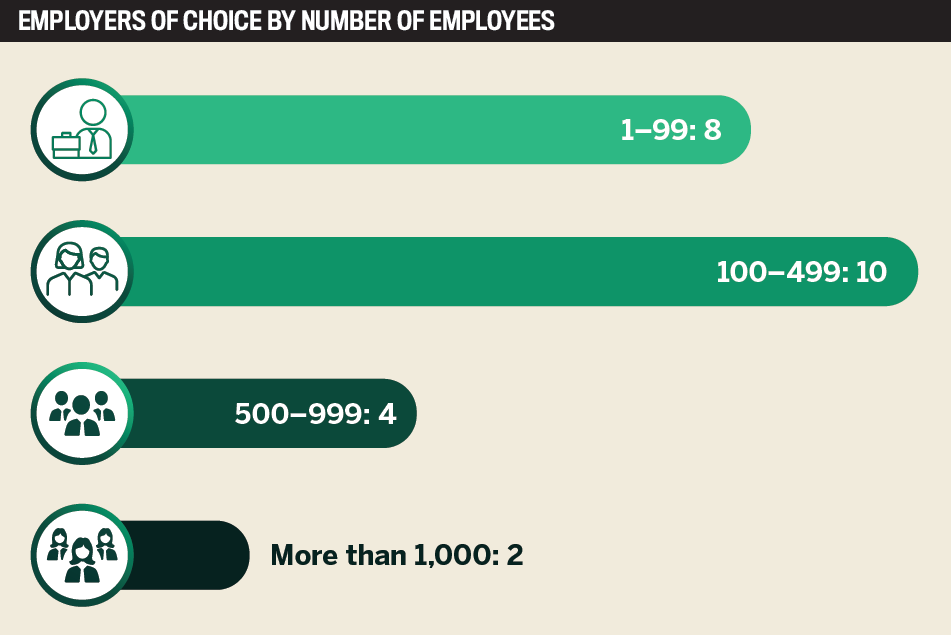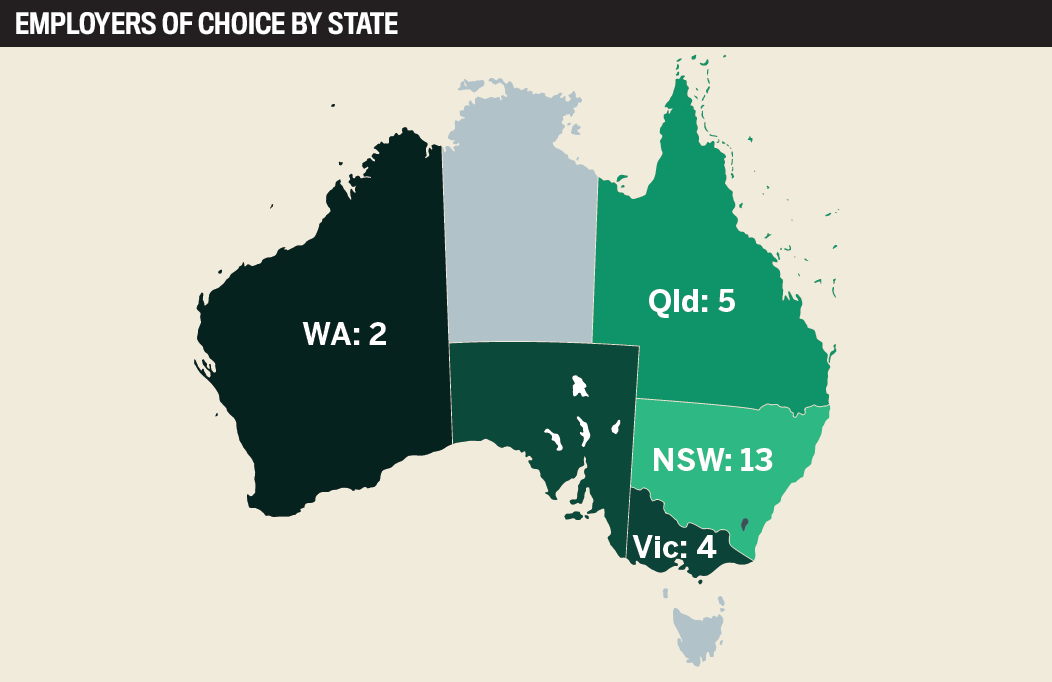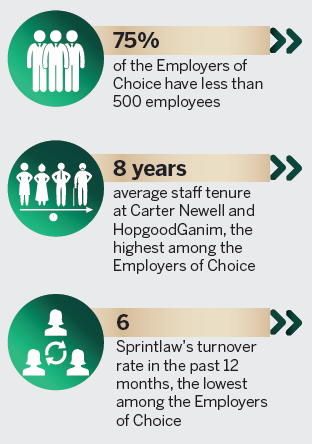

Jump to winners | Jump to methodology | View PDF
The occurrence of the COVID-19 pandemic early last year ushered in various challenges. As restrictions were enforced across the globe, economies everywhere took a hit, and organisations struggled to address the impact of disruptions on their businesses. As a result, many employees got the short end of the stick when companies announced layoffs, pay cuts, pay freezes and furloughs to cut costs.
Law firms faced similar challenges. Nonetheless, many firms rose to the occasion on behalf of their employees. As remote working became the norm, new initiatives were developed to foster camaraderie among colleagues despite limitations caused by screen-based communication. Companies provided technical support to make the transition to working from home easy. Several firms were also willing to alter their work processes by incorporating more of what employees wanted into their operating models.

A test of adaptability
For HBA Legal managing director Brett Ablong, transitioning to a work-from-home arrangement tested the firm’s existing IT systems, but it was a test the firm passed with flying colours.
“HBA was, in fact, one of the first Australian law firms to move to remote working when COVID-19 first hit. I recall some of our people telling us about their friends at other firms who were still being required to attend the office at a time when our teams had been working remotely for weeks,” he says.
“This is something I am really proud of – we were agile, saw the writing on the wall and moved swiftly to get our people at home where they were safest under the circumstances.”
Going remote was a relatively smooth process for HBA Legal given that flexible arrangements were already being implemented in the firm prior to the pandemic.
“We’d always had flexible working policies in place and pre-COVID-19, we had many people who worked remotely either exclusively or part of the week,” Ablong says.
“But generally, pre-COVID, those people who worked flexibly did it due to parenting responsibilities. I think people probably felt that they couldn’t ask to work a couple of days from home if they didn’t have kids.”
As the pandemic made remote working the norm over in-person appearances in the office, the firm realised it could go further with flexibility.
“Even before we came out of the first national lockdown last year, after it was clear some people really liked that way of working, we said, ‘Please know, anyone can work like this permanently – you don’t have to be a parent to have a discussion with your supervisor and put in place a flexible ongoing working arrangement.’ This was absolutely welcomed by our team,” Ablong explains. He says that the firm focuses on outcomes rather than how employees work.
“We now have younger employees working some of the week at home who say they just like to work one day at home. On that day, instead of standing at the water cooler having a chat, they can put on a load of washing and get ahead on their weekend chores. I have no issue with that,” he says.
“If people are delivering the outcomes we need them to deliver, it really doesn’t matter to me where they work from.”
LOD also made sure its employees were adequately supported after the office doors were shut.
“We experienced a smooth transition to remote working, especially from a tech perspective. All members of our HQ team were given laptops and cloud-based productivity tools, which made remote collaboration quite seamless,” says Paul Cowling, Australia managing director at LOD.
The firm kept the communication lines open with employees, especially with regard to returning to the office, to consider the best interests of staff in different locations.
“To facilitate the shift back to some offices, LOD has implemented region-specific return-to-work plans. The plans and guidelines were shared with our HQ teams so everyone could feel comfortable and safe knowing that LOD had carefully considered all aspects of returning to our offices,” Cowling says.
“Employees were advised that LOD would continue to monitor and adhere to all government health advice warnings and alerts, and would communicate with the team regularly.”
Checking up on colleagues
LOD also facilitated communication among employees in various ways – a buddy system program that encouraged people to talk about non-work topics, a shoutout page where employees could prop one another up, a regular radio show held for the firm’s different offices, and regular webinars led by experts and leading GCs in Australia.
“We believe a culture based on trust and transparency is essential for effective remote working – it will facilitate collaborating via asynchronous communication and distributed workplaces and help keep everyone aligned to the same goals,” Cowling says.
Communication was a key element of law firms’ operations over the past year, as the inability to meet regularly affected mental health. Thus, many firms introduced measures to ensure employee wellbeing.
LOD identified burnout, maintaining physical and mental health, and dealing with fatigue as the top employee-related issues encountered by the firm in the last 18 months.
“With an abundance of Zoom/Teams calls, often back-to-back, a commonly reported issue was tiredness and maintaining focus,” Cowling explains.
“Burnout and difficulty maintaining both physical and mental health and wellbeing were due to a combination of more challenging living environments, blurred lines between home and office, and a broader world-weariness caused by the pandemic.”
The firm responded to these concerns by bolstering its mental health first-aid training initiative and asking certified employees to share their knowledge with colleagues. During lockdown, the firm also had COVID-relief care packages delivered to employees.
In addition, LOD held lunchtime sessions in which participants could discuss their thoughts and mindsets with a former lawyer and registered hypnotherapist. The sessions enabled employees to visualise their goals and develop effective habits. To emphasise the importance of wellbeing, the firm has introduced support, education and engagement resources to new hires.
HopgoodGanim Lawyers launched more communication avenues through which employees could provide updates. “We’ve also focused on more regular firm events and functions to have opportunities for people to come together,” says managing partner Bruce Humphrys. The firm also maintains a regular schedule of check-ins with staff.

Development opportunities
Humphrys says that even after the pandemic, HopgoodGanim will sustain its focus on connection and collaboration, as well as managing remote workers. The firm intends to invest in technology and improve its support of flexible working arrangements.
“The immediate shift to remote work was largely seamless as the firm had the technology and infrastructure in place prior to the pandemic,” Humphrys says. “HopgoodGanim Lawyers has maintained flexible working options, and we have approximately 35% of staff working from home each day.”
HBA Legal is concentrating on leadership and career development opportunities for employees. “In a law firm, traditionally, people tend to get promoted based on being technically brilliant, not necessarily because they are a great people leader. And so, they get to the level of a partner but have no idea how to manage people beyond checking their advice before they get sent out,” Ablong says.
“There is so much more to being a partner in my view. Partners have a great responsibility to their people to develop their careers and create a culture that’s inspiring so they can get the best out of their team.”
The firm’s link to claims management giant Crawford has granted staff access to the company’s leadership development programs.
“In the past six months, we’ve had a big push on leadership development for anyone who manages people or has direct reports,” Ablong says. “These are skills that only some naturally have, but fortunately, these skills can be taught, and we are focusing a lot on this to ensure all our leaders are well-rounded. I think this a fundamental platform in a happy workplace.”
For the 24 firms on the Australasian Lawyer’s Employer of Choice list, putting their people first has certainly led to developments that can bring long-term benefits.
From 19 July to 13 August, Australasian Lawyer invited nominations for the sixth edition of its Employer of Choice list. The publication aimed to focus the spotlight on law firms in Australia that introduced the most effective employee-centred programs during a challenging period.
Firms were asked to list their initiatives to address the following key areas that the research team considered critical to a positive employee experience: remuneration, training and professional development, career progression, diversity and inclusion, access to technology and resources, communication, leadership, work-life balance, health and wellbeing, reward and recognition, and recruitment. Participants were also asked to state their achievements in these areas.
The research team obtained quantitative and qualitative information to confirm how the firms performed as leading workplaces. Twenty-four firms proved that they met the criteria to be named Employers of Choice.
